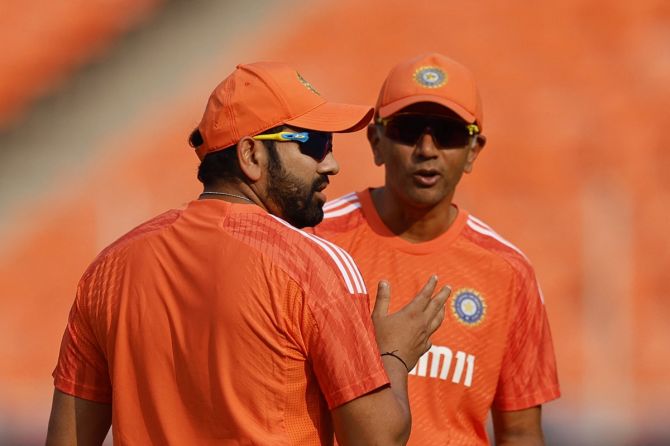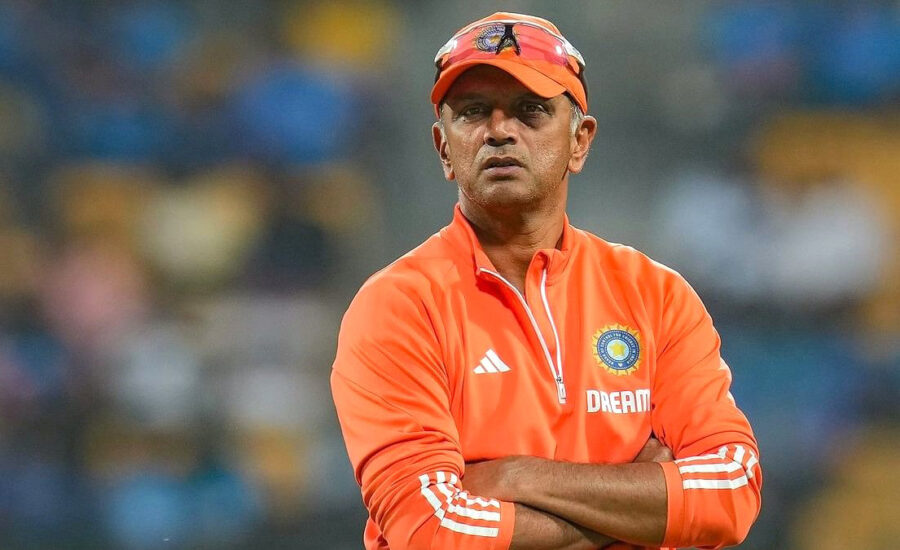Rahul Dravid : Refused to chop and change and worked to support the captain in realizing his vision
As the veteran Rahul Dravid says goodbye to Team India, he explained that in his time as head coach. He hated cutting and switching up the lineup too much and always sought to act as a counterbalance for captain Rohit Sharma so that he could come up with winning plans of his own.
India’s victory in the T20 World Cup in Barbados last week, where they defeated South Africa and won the trophy for the second time since 2007, marked the end of Rahul Dravid’s coaching career.
In a video that BCCI released on Saturday,Rahul Dravid stated, “I actually like continuity and don’t like to chop and change too many things because I believe that creates a lot of instability and doesn’t create a very good environment.”
“I consider myself to be a member of the team whose job it is to establish the proper formal, safe, and secure atmosphere that pushes individuals without truly instilling a fear of failing. That has been my constant goal.”
Being the new coach and having “never envisaged” dealing with six captains, Rahul Dravid remarked that he had difficulty during the players’ recovery from the COVID-19 pandemic.
One of the things that we had to deal with was during the first few months of my coaching career in India. We were situated at the far end of the Covid limitations. We have to oversee their workloads across all three types effectively. I worked with about five to six captains over the first eight to ten months of my tenure because of a few injuries.”
“It was definitely something that I hadn’t envisaged, or not something that I thought about, but it just sort of organically happened.”
India defeated England in the five-match Test series at home under Rahul Dravid’s guidance, and the squad advanced to the 2023 ODI World Cup final.

The pandemic had some positive effects, too, as many young people could experience being a part of the India squad, even though Covid placed a lot of limitations on players and they essentially lived in a “bubble case” at all times.
“The other thing that happened, which was lovely to watch, was that we had to have virtually always two teams playing simultaneously in different parts of the world because we played so much cricket after Covid, and we had so many series to fit in.
“Over the last 2-1/2 years, especially in white-ball cricket and lately towards the back-end (of my career) even in red-ball cricket, we were able to give a lot of youngsters a lot of opportunities, bring a lot of people into the side.”
“Some of them developed and stayed on in the side a little bit longer, but some of them, they were there because at that point of time maybe some seniors were resting.”
Rahul Dravid has been friends with Indian greats like Virat Kohli and Rohit Sharma since they both started in international cricket at the tail end of their careers.
Working with Rohit, who I knew as a small boy, has been a lot of fun. It’s been amazing to watch him develop as a person and as a leader in Indian cricket. His contributions to the team over the past ten or twelve years, both as a player and leader, are a testament to his hard work and dedication.
“I’ve really liked getting to know him as a person as well as witnessing his dedication to and concern for the team—to simply strive to create the ideal atmosphere in which everyone is comfortable, confident, and having fun. I will miss having that.”
Even with someone such as Virat. There were only a few series and matches in the early days with him as captain. I learned more about him, observing his business practices and the professionalism he consistently exhibits. He wanted to get well, to get better. I’ve found it intriguing to watch.”
Rahul Dravid claimed that because he has always valued the process, people have occasionally misinterpreted him as lacking a focus on results.
“That’s (the outcomes), in my opinion; obviously, it matters. People think, “Oh, I think the results are not significant,” when I say this repeatedly. Results are crucial, of course.
“My goal in this business is to deliver outcomes. However, as a coach, it’s always my job to consider what I can do to influence the outcome. In the end, though, our job should be to support the captain in executing his ideas and vision for the way the team should play.”
“Obviously, winning cricket matches is inevitable. You make every effort to succeed. That is where you begin. However, I always consider what exactly leads to victory. What steps are necessary to win more games, and how do you win more of them?”
“My goal was to attempt and perfect that procedure. Checking every single box. Do we provide the gamers enough of a challenge? Do we practice enough? Are we technically and tactically ready? Are we setting up the proper environment and providing the players with the best assistance we can?”
These are the items that must be checked off before you can win. If you follow through on these actions, the victory may come to you most of the time.
Also Read : PM Modi and Rohit Sharma’s T20 World Champions Meet at His House
